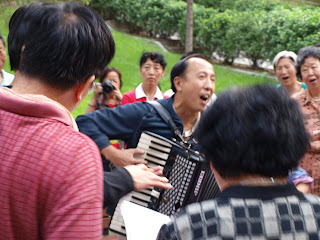After the calm and quiet of Laos, it's no understatement to say that China has been an incredible shock. The sensory overload hit right as I got off the bus taking me from the Tianjin airport to that city's train station- cars and people were everywhere, and the smog almost completely blocked out the early morning light. The high speed train took me the 80 miles to Beijing in under 30 minutes (ticket price, $10), and soon enough I was eating breakfast with Kyle, my travel buddy for the next 3 months, and his friend Stacey.
 Outside of the Tienanmen Gate
Outside of the Tienanmen Gate
No amount of preparation could have prepared me for what I encountered exploring Beijing my first day there. The city is ENORMOUS, in both population (15 million and counting) and scale. A city block is about half a mile long, and skyscrapers and cranes fill the horizon. Cars choke the streets, bikes and electric scooters weaving around the traffic jams.
The best way that I've come up with to describe the city is a living, breathing dichotomy. Old neighborhoods called hutongs, with their narrow lanes, quiet streets, and bucolic pace of life, seem to be worlds away from the hypermodern city that surrounds them. (Says Kyle as we bike through a hutong: "Can you believe that we're in a country that's at all developed?"). Men in business suits walk through parks where old women in traditional dress gather to sing karaoke and practice their ballroom dance skills. A bicycle crammed with 5 people stops at an intersection next to a Mercedes, both vehicles unaware of, or simply not acknowledging, the contrast between them. A McDonalds sits a quarter of a mile from Mao's mausoleum. Past and present, old and new, developed and underdeveloped; all of these opposite lie right next to each other in Beijing, and no one seems to bat an eyelid.
 Biking through old Beijing neighborhoods
Biking through old Beijing neighborhoods
 Choir practice in a Beijing park
Choir practice in a Beijing parkOur four days in Beijing took us to all the major attractions. The Forbidden City is beyond massive, with buildings and palaces that seemingly never end. The Temple of Heaven sprawls just as much, encompassing pagoda after pagoda. A bike tour of the hutongs allowed us to see what life in the city was like before the push for development and modernization. Unfortunately, a bout of illness kept me from going to the Summer Palace, and Mao's Mausoleum was closed our four days there for "special reasons" (meaning that my pursuit of the Dead/Embalmed Communist Leaders Triple Crown- visiting and viewing the bodies of Lenin, Mao, and Ho Chi Minh- has been at least temporarily set back). But apart from those two setbacks, everything we wanted to see, we saw.
All in all, Beijing is an experience, something that, like most things in China, has to be seen to the truly appreciated.